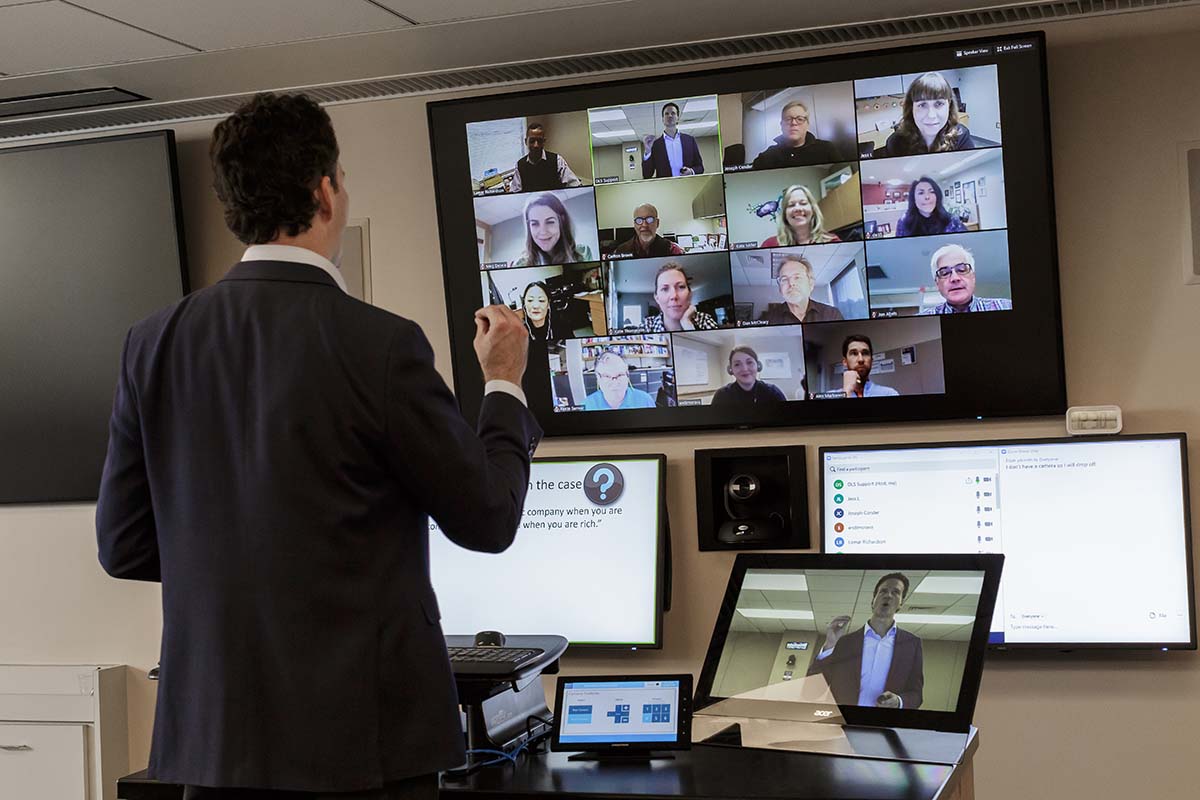Gain a Broad Perspective
Whether you are inside the biotechnology and pharmaceutical industry or someone who interacts with the industry (for example, a payer, provider, consultant, or investor) Drug Development, Reimbursement, and Regulation (virtual) will broaden your perspective of the fundamentals and changes in the industry. The live-streamed course consists of virtual discussion-based class sessions on key trends in biotechnology and pharmaceuticals, such as:
- Increasing pressure on prices
- Some government factions look to tie U.S. drug prices to foreign prices, while others want to negotiate drug prices. How will these policies affect which drug development and launch strategies you choose?
- Drug makers are exploring alternate pricing, including an outcomes-based pricing model in which they are paid only if the drug works. Under what conditions should payers and drug makers sign outcomes-based contracts?
- Smaller patient populations
- Diagnostics are becoming better at identifying which patients respond best to which medicines. Should your organization partner or merge with diagnostic organizations in your vertical? How does the availability of a diagnostic affect your launch price?
- Many companies are focusing on rare diseases, moving away from the old mass-market model. Will there still be mass-market drugs? If all drugs are for rare diseases, what does this mean for regulation, prices and spending?
- Lifecycle of a drug from innovation to generic competition
- Drug makers rely on patents and exclusivity, including exclusivity for orphan drugs, for pediatric testing, and for data. Even generic drug makers receive exclusivity protections from other generics. When do these exclusivities apply and how do they change behavior?
- Faced with patent expiration, drug makers experiment with ways to extend revenue, including launching follow on products, authorized generics, and over-the-counter products. Given increasing pressure from payers to choose cost-effective drugs, can these strategies succeed?
Who Should Attend?
This live, online program offers a broad perspective of the issues surrounding the identification and introduction of new drugs, which will be useful to:
- Mid to senior-level health care leaders who either work in biotechnology and pharmaceuticals or interact with those who do.
- Within biotech and pharma, those occupying roles in strategy, marketing, R&D, product development, sales, government affairs, and business development.
- Leaders who have recently switched careers into health care, consultants with health care clients, scientists and MDs who want to commercialize a drug, and health care investors.
NOTE: This virtual program will dive deeper into drug development strategies and challenges, making it a valuable complement to our Virtual Navigating Health Care Trends program.
"Professor David Ridley successfully harnessed the power of core academic modeling blended with real-life business cases to deliver extremely relevant training. The complex and in-depth content was presented in an easily digestible format. Moreover, the supporting materials that were provided will continue to be valuable references for all attendees to lean on when making critical decisions. In a marketplace full of claims of “domain expertise,” it was refreshing to learn from an instructor who has directly impacted the pharmaceutical industry in significant ways."
Christopher KennedyPresident of Elixell Therapeutics
Recent Drug Development, Reimbursement, and Regulation (virtual) participant
More About this Program
Are you ready to gain substantial insights into how the drug development industry works from a range of industry player perspectives? Enhance your contributions to your organization and increase value for your stakeholders by understanding the opportunities and challenges in creating and executing new drug products.
This virtual course consists of:
- Three 90-minute live-streamed class sessions (held weekly over the three-week period)
- Twelve supplementary 15-minute videos, which you should review at your convenience prior to the 90-minute faculty-led class
- Robust live, online class discussions with your instructor and other participants, who come from across the health care industry
Classes will be held using Zoom video-conferencing, which has been extended into a virtual teaching system. This system creates a virtual classroom where you can see the professor and presentation screen, as well as seeing the other participants. Similarly, the professor can see all of the students who engage online during the group session. You’ll be able to communicate with both the professor and your peers through this platform. The professor uses the same technology to teach executive MBA students.
To participate in this course you will need to have a working webcam, built in or attached, and have downloaded the Zoom Cloud Meeting app onto your laptop.
If you have any questions about this requirement, call Duke Executive Education team at +1.919.660.8011 or Toll Free +1.800.372.3932, or email us at execed-info@duke.edu.
Understand the economics behind different business strategies
Course Topics
Innovation
- The cost of R&D
- The stages of drug development
- Tradeoffs between orphan and blockbuster development
- Government incentive to devise new drugs
Reimbursement
- Netflix model
- Outcomes-based pricing
- Cost effectiveness analysis
- Rebates, formularies & pharmacy benefit managers
- 340B program
- Medicaid Best Price
Competition
- Lifecycle management strategies
- Biosimilars
- Generics
Program Objectives
At the conclusion of the program, you will understand:
- How researchers estimate the average industry cost of research and development for an approved drug.
- How to estimate the value of a drug in development in order to make better decisions about which drugs to advance and which drugs to stop.
- What incentives governments create to reward developers of drugs for rare and neglected diseases.
- How governments regulate drug makers and the steps drug makers must take to avoid penalties, fines, lost revenue, and embarrassment.
- How to estimate the cost effectiveness of a drug in order to secure reimbursement.
- What price regulations have been proposed and which are likely to be implemented.
- What are the new approaches to pricing, including the “Netflix Model” and outcomes-based pricing, and under what conditions drug makers and payers should adopt them.
- How to estimate a drug’s peak market share in order to forecast sales.
- What role intermediaries such as pharmacy benefit managers play in drug access and reimbursement.
- What ten strategies drug makers use to extend sales of a drug approaching patent expiration.
- How generic drug makers compete with brand name drug makers.



